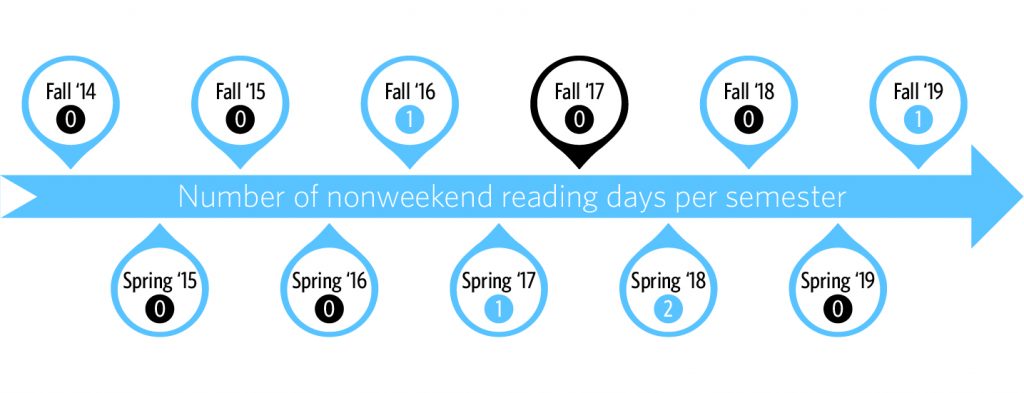With the last week of classes comes the impending doom of finals week — and the realization that this semester, there are only two reading days to prepare for exams after classes end.
The reading days, as the University refers to them, are simply the Saturday and Sunday before finals begin. Students would have those days off anyway, so for the University to designate these days as reading days is nonsensical.
The Editorial Board has examined how the University has designated reading days for finals week in the past, and how it plans to designate them for future semesters. Save for a few semesters in which additional weekday reading days were provided, the reading days are all simply weekends.
This is unfair for more than one reason.
From a mental health standpoint, the University is not being considerate by neglecting to give students a break after classes end for mental health purposes. This semester, the last day of classes is Friday, Dec. 8, and finals begin on Monday, Dec. 11. This only leaves the aforementioned reading days in between the end of classes and the beginning of finals, which is not sufficient.
We will be forced to cram all of our studying into that weekend, which can prove exceedingly stressful for students who have finals on Monday or Tuesday.
The University seems to be aware of mental health concerns for students — it holds “De-Stress December” events for students, which include relaxing activities and services like free massages, free coffee and therapy dogs. However, even with this initiative in place, the University fails to consider mental health in a larger sense.
Additionally, the Editorial Board has found that some professors have been scheduling tests and due dates for final papers or projects during the last week of classes. This clearly violates a provision in the Faculty-Staff Handbook that states “Except examinations for labs, students shall not be required to take examinations or turn in take-home finals during the week preceding the official Final Examination Period.”
Although due dates and exams during the last week of classes are against protocol, we must, of course, still follow our syllabuses and professors’ rules. This makes it even harder to get a head start on studying for the final exams we have during finals week, or to work on final papers or projects that are due during finals week, like they should be.
Furthermore, professors and teaching assistants are typically not available to answer questions or review material during the assigned reading days, since they occur over the weekend. It’s unjust to expect students to fully prepare for exams without assistance from professors and TAs during the reading period. In addition, mental health services are not available during these weekend reading days.
We believe that the University should designate the same number of reading days every semester, and weekends should certainly not be considered sufficient reading days. Students may have four or more final exams to study for and take in a given semester, and two days without classes to study — that we would have had free anyway — are not sufficient to study effectively, while still taking care of ourselves. Additionally, professors must act in accordance with the provision that prohibits them from assigning final examinations during the week preceding the official Final Examination Period.
Students need sufficient additional time to study for exams and complete take-home finals and essays once classes have ended. If the University really wants to be considerate of our mental health and well-being, we must be given adequate time to succeed throughout a highly stressful week.



